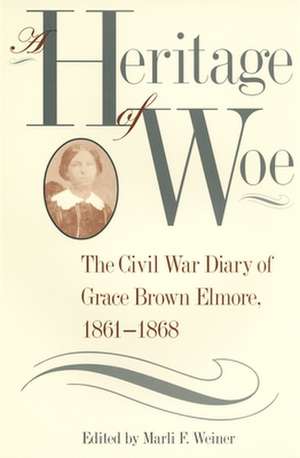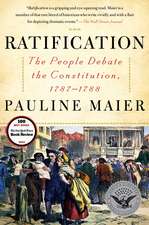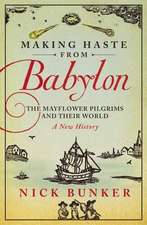Heritage of Woe: Southern Voices from the Past: Women's Letters, Diaries & Writings S.
Autor Grace Brown Elmore Editat de Marli F. Weineren Limba Engleză Hardback – 31 mar 1997
Preț: 374.09 lei
Nou
Puncte Express: 561
Preț estimativ în valută:
71.58€ • 74.94$ • 59.23£
71.58€ • 74.94$ • 59.23£
Carte tipărită la comandă
Livrare economică 07-21 aprilie
Preluare comenzi: 021 569.72.76
Specificații
ISBN-13: 9780820318547
ISBN-10: 082031854X
Pagini: 225
Dimensiuni: 161 x 236 x 25 mm
Greutate: 0.56 kg
Ediția:New.
Editura: University of Georgia Press
Seriile Southern Voices from the Past: Women's Letters, Diaries & Writings S., Southern Voices from the Past (Hardcover)
ISBN-10: 082031854X
Pagini: 225
Dimensiuni: 161 x 236 x 25 mm
Greutate: 0.56 kg
Ediția:New.
Editura: University of Georgia Press
Seriile Southern Voices from the Past: Women's Letters, Diaries & Writings S., Southern Voices from the Past (Hardcover)
Notă biografică
Textul de pe ultima copertă
This diary chronicles the defining years in the life of Grace Brown Elmore, one of eight children in a wealthy and influential Columbia, South Carolina, family. Begun just five months into the Civil War, when Elmore was twenty-two, it is a rich and observant personal account of a society in the midst of chaotic change. At her diary's opening, Elmore had every reason to believe that she would someday marry, bear children, and have a life filled with music, church, visits - all of the amenities and activities customary to her comparably privileged network of relatives and friends. Like them, Elmore would also have servants, as many owners preferred to call their slaves. Despite her early optimism and enduring devotion to the Confederacy, Elmore, who never did marry, found that the war eroded all stability and certainty from her life. Even before the South's fall, Elmore, like other elite young southern white women, had seen the old verities destroyed and had been forced to re-assess all that she had been taken for granted before poverty, uncertainty, and loneliness became her daily companions. Elmore's descriptions of wartime life tell of the Confederate army's retreat from Columbia, the burning of the town, and the consequences of Sherman's occupation. Hearing, near the war's end, that "arms were waiting but men were wanting", she cursed her male protectors' lack of resolve, but not surprisingly transferred her anger to their "faithless, avericious, cruel and wicked" northern aggressors. Elmore's details of the transition to peace and the harsh economic realities of Reconstruction relate her work as a teacher and, whether fondly recalling her mammy, Mauma Binah, or bemoaning the "impertinence" of newly freed slaves, she also provides a wealth of material on southern racial attitudes. The diary is also filled with unusually candid glimpses into the dynamics of her family, which Elmore described as "a confederacy of hard headed, strong minded, self willed women". In her younger years Elmore wrote of feeling "hemmed in ... by other people's ideas" and often chafed at her society's notions about women's domesticity. Although she rose to every challenge before her, Elmore's diary nonetheless suggests that the autonomy and independence she had longed for early in her life came under circumstances that made them a penalty, not a prize.
















